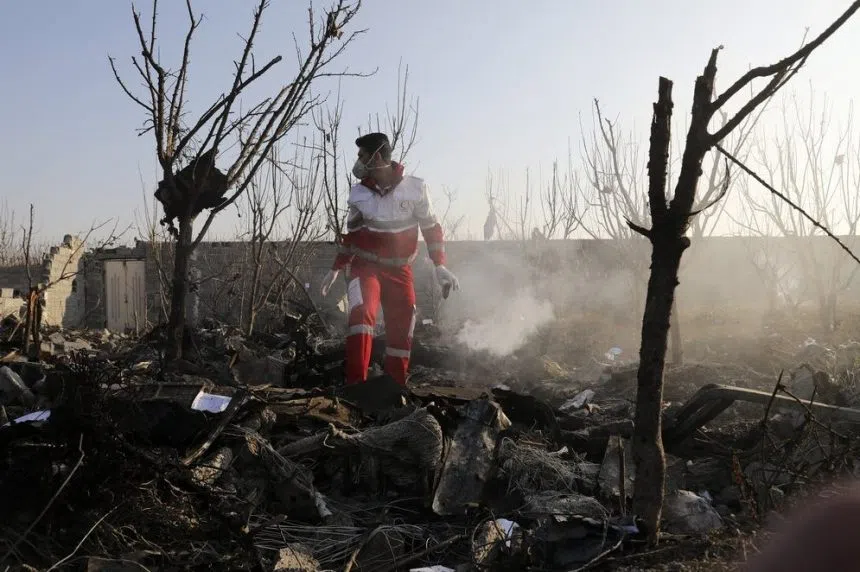Students attending several Canadian universities were among the 176 people who died Wednesday morning when a Ukrainian passenger plane crashed in a field shortly after taking off from the airport in Iran’s capital Tehran.
At least nine students from three Ontario universities were confirmed among the crash victims — four from Western University, three from the University of Ottawa, and two from the University of Guelph.
Western said three were current graduate students and one was an incoming graduate student.
“We grieve their loss and the other passengers aboard this flight,” the school said in a statement. “Out of respect for their families, we are not naming the students at this early stage until more information is available.”
The University of Ottawa said it trying to assess if any other students, faculty or staff members were also on the plane. The University of Guelph identified the victims as Ghanimat Azdahri, a PhD student in the department of geography, environment and geomatics, and Milad Ghasemi Ariani, a PhD student in the marketing and consumer studies.
The Ukraine International Airlines Boeing 737-800 was en route to Kyiv — Ukraine’s capital — went it went down.
Several other Canadian schools were going through the heartbreaking task of determining whether any of their students were aboard the plane. According to the airline’s passenger list, which includes birthdates, more than a third of passengers were 30 and under.
Ukraine’s Foreign Minister Vadym Prystaiko said the plane was carrying 63 Canadians, 82 Iranians, 11 Ukrainian passengers and crew, 10 Swedes, four Afghans, three Germans and three Britons.
A spokesman from University of Waterloo said they were aware that two of their PhD students are on the passenger list released by the airline. The university said it was working on getting more information from family members.
University of Guelph President Franco Vaccarino said his thoughts go out to the two students’ families. Azdahri’s partner, who was living with her in the university’s family housing, also died in the crash, the school said.
The crash comes in a region where tensions have been running high following the American assassination of a top Iranian general near Baghdad and retaliatory missile attacks on U.S. bases in Iraq. Ukrainian authorities initially said it appeared mechanical failure was to blame for the crash, but later walked that back, saying nothing had been ruled out.
Prime Minister Justin Trudeau said he was “shocked and saddened” at the loss of life, and promised the crash would be thoroughly investigated.
“Today, I assure all Canadians that their safety and security is our top priority,” he said Wednesday in a statement. “We also join with the other countries who are mourning the loss of citizens.”
Transport Minister Marc Garneau said Canada would offer technical assistance in the crash investigation. Garneau expressed condolences to “all those affected by the heartbreaking tragedy.”
Payman Paseyan, a member of the Iranian-Canadian community in Edmonton, said multiple people from the city, including many international students, were on Flight PS752. He said he knew many of the victims.
“They leave behind families and people they love and they come to Canada and often they’re second guessing, ‘Should I leave my family behind to do this’?” Paseyan said. “Then they move here and they do all this just to board a plane and have it all washed away. It’s devastating.”
Global Affairs Canada warned against any non-essential travel to Iran “due to the volatile security situation, the regional threat of terrorism and the risk of arbitrary detention.” The agency said Canadians, particularly those holding dual Canadian-Iranian citizenship, were at risk of being arbitrarily questioned, arrested and detained.
Paseyan said members of the Iranian-Canadian community learned of the crash while being glued to the news after Tuesday’s missile attacks in Iraq.
“Many were expecting their friends and families members to come back … (and) were well aware what flight they were on,” said Paseyan, a former president of the Iranian Heritage Society of Edmonton. “They were worried about their family members that were in Iran, and now this has compounded that with worry for the community.”
Ukraine’s ambassador to Canada, Andriy Shevchenko, said his heart was broken.
“We will have to go through this terrible pain together with our Canadian brothers and sisters,” Shevchenko said in a tweet.
The plane, fully loaded with fuel for its 2,300-kilometre flight, slammed into farmland near the town of Shahedshahr on the outskirts of Tehran. Videos show fires lighting up the darkened fields before dawn and rows of body bags laid out along the side of a road.
Hamid Gharajeh, of the Iran Democratic Association of Canada, said he’s spoken to families and friends of some of the victims. Many aboard were students on their way back to Canada after the holiday break, he said.
“Our hearts go out for all these young people who are just trying to get back to their lives,” Gharajeh said in Toronto. “It’s unfortunate.”
Airline officials said most of the passengers had planned to transit through Kyiv to other destinations. A list of victims posted by the airline showed one of the victims was a baby.
The plane had been delayed from taking off from Imam Khomeini International Airport by almost an hour. It never made it higher than 2,400 metres, data from the flight-tracking website FlightRadar24 indicates.
Qassem Biniaz, a spokesman for Iran’s Road and Transportation Ministry, said it appeared fire erupted in one of the plane’s engines. The pilot then lost control and the plane crashed to the ground, Biniaz said, according to the state-run IRNA news agency.
It was one of the deadliest air disasters involving Canadians.
In 1985 a bomb exploded and killed 329 people aboard an Air India flight from Montreal to New Delhi over the Atlantic Ocean. Most victims were Canadian.
— With files from The Associated Press
The Canadian Press







